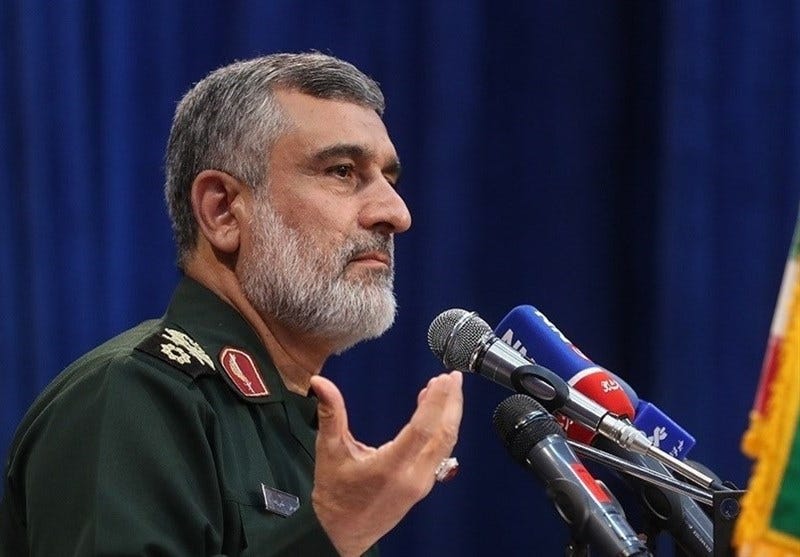IRGC Aerospace Chief Warns Enemies, Declares Missile and Drone Power Stronger Than Ever
Brig. Gen. Hajizadeh highlights Iran’s upgraded strike capabilities and dismisses foreign threats, citing success of 'Operation True Promise' missile campaigns
Iran, PUREWILAYAH.COM - Brigadier General Amir Ali Hajizadeh, commander of Iran’s Islamic Revolutionary Guard Corps (IRGC) Aerospace Force, declared that Iran's military power—particularly in missile and drone technology—has reached unprecedented levels. Speaking before members of the Iranian Parliament, Hajizadeh said the country is more prepared and powerful than ever, adding that no military threat against Iran has any real credibility.
“Today we are stronger and more prepared than ever,” Hajizadeh stated, according to Ebrahim Rezaei, spokesman for the Parliament’s National Security and Foreign Policy Committee.
“No military threat against the country has a real basis.”
Hajizadeh emphasized that Iran’s advanced missile and drone systems, particularly showcased in retaliatory strikes last year, serve as a robust deterrent against adversaries. His comments came amid growing regional tensions and reports of continued Israeli provocations.
Operation True Promise II Called ‘Largest Missile Operation in the World’
Highlighting Iran's military response to Israeli aggression, Brig. Gen. Hajizadeh cited Operation True Promise II—a massive missile strike conducted in October 2024—as proof of Iran’s operational effectiveness and deterrent strength.
Describing the operation as the largest of its kind globally, he noted that more than 75% of the launched missiles hit their intended targets, which included Israeli military and intelligence facilities.
“This success sent a strong message to the enemies, especially the Israeli regime,” he declared.
The IRGC launched Operation True Promise I in early April 2024 in direct retaliation for Israel’s strike on Iran’s diplomatic compound in Damascus, Syria, which killed seven Iranian personnel, including two senior generals.
The second wave of missile strikes, Operation True Promise II, came on October 1, 2024, and was carried out in response to the assassinations of senior resistance leaders: Hamas political chief Ismail Haniyeh, Hezbollah Secretary-General Hassan Nasrallah, and IRGC commander Abbas Nilforoushan.
According to Iranian officials, both operations utilized only a limited segment of Iran’s available missile arsenal.
Iran Denounces Western and Israeli Media Propaganda
General Hajizadeh, through the words relayed by MP Ebrahim Rezaei, dismissed claims by Western and Israeli media suggesting a decline in Iran's military strength, branding them as psychological warfare and deliberate disinformation campaigns.
“The enemies are trying to deceive public opinion by portraying a weakened image of the Islamic Republic,” Rezaei quoted Hajizadeh as saying.
Rezaei added that Iran’s military capabilities have not declined, but in fact have increased significantly compared to previous years.
“Iran's enemies are now more vulnerable than ever in the face of Iran's offensive capabilities,” Rezaei stated, “and they are unable to inflict damage on the country's defense structure.”
Tehran Signals Operation True Promise III Still on the Table
Reaffirming Iran’s readiness to escalate if necessary, Major General Yahya Rahim Safavi, senior military adviser to the Leader of the Islamic Revolution Ayatollah Seyyed Ali Khamenei, announced in March that Operation True Promise III remains an active component of Iran’s strategic playbook.
Safavi stated that any future strikes would be conducted in response to Israeli aggression and would be executed at the discretion of Ayatollah Khamenei, based on the Leader’s judgment and timing.
This underscores Iran’s continued commitment to deterrence through strength and signals its intention to maintain a posture of calibrated but resolute military readiness in the face of regional threats. (PW)
Source: Tasnim News


